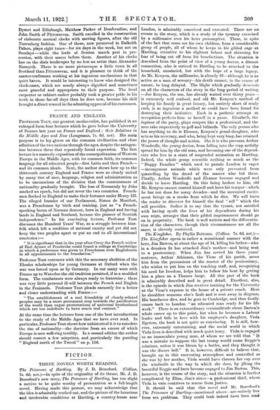FICTION.
THREE NOVELS WORTH READING.
The Prisoners of Hartling. By T. D. Beresford. (Collins. 7s. 6d. net.)—In spite of the originality of its theme, Mr. J. D. Beresford's new story, The Prisoners of Hartling, has too slight a motive to be quite worthy of presentation as a full-length novel. Having made this protest, we may acknowledge that the idea is admirably worked out, and the picture of the luxurious and intolerable conditions at nestling, a country-house near London, is admirably conceived and executed. There are no events in the story, which is a study of the tyranny exercised by a millionaire over his heirs presumptive. These, in spite of the fact that some are his own children, form a considerable group of people, all of whom he keeps in his gilded cage at Hartling, attentive to his slightest behest and shivering for fear of being cut off from his benefactions. The situation is described from the point of view of a young doctor, a distant connection, who is enticed to Hartling to be attached to the household, unsalaried, but with the hope of a large legacy. As Mr. Kenyon, the millionaire, is already 91—although he is as active as a man of seventy—his death cannot, in the course of nature, be long delayed. The blight which gradually descends on all the characters of the story in the long period of waiting —Joe Kenyon, the son, has already waited over thirty years— is extremely well realised, and old Mr. Kenyon's method of keeping his family in great luxury, but entirely short of ready cash, is as ingenious a method as could have been found for destroying their initiative. Each in a pathetio attempt at occupation perfects him- or herself in a game. Elizabeth, the ingenue of the party, plays croquet like a professional, and the men take respectively to golf and billiards. The only person who has anything to do is Eleanor, Kenyon's grand-daughter, who acts as his secretary, and who, being kept very busy, has retained the power of thought and action. She it is who prevents Arthur Woodroffe, the young doctor, from falling into the trap artfully spread for him by the old man, and becoming one of the depend- ents who live in a state of suspended animation at Hartling. Indeed, the whole group resemble nothing so much as the "Happy Families" which used to parade London in cages —incongruous animals which were only prevented from quarrelling by the dread of the master who fed them. Finally, Arthur Woodroffe and Eleanor become engaged and decide to leave nestling. On this being broken to him, old Mr. Kenyon cannot control himself and loses his temper—which he has not done for many decades—and the unwonted excite- ment brings on a stroke from which he dies. We will leave the reader to discover for himself the final " sell " which the will provides. Suffice it to say that the tyrant, not satisfied with having spoilt tho lives of his dependents during his own reign, arranges that their gilded imprisonment should go on in perpetuity. The book is well written and the differentia- tion of the characters, though their circumstances are all the same, is cleverly contrived.


































 Previous page
Previous page